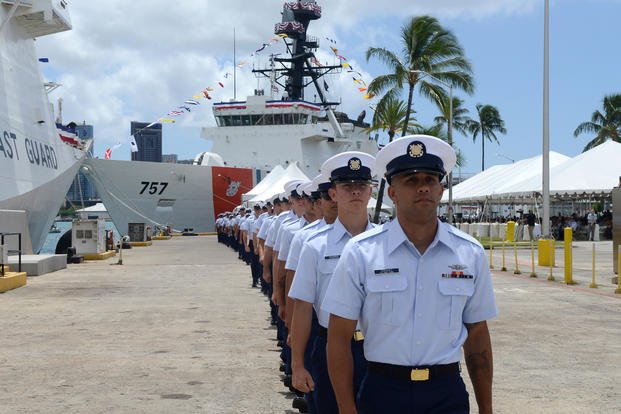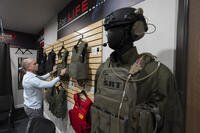About 41,000 active-duty men and women serve in the Coast Guard, the smallest branch of the U.S. armed forces and one that stands as the nation's first line of defense against maritime threats. It is responsible for protecting and defending more than 100,000 miles of U.S. coastline and inland waterways.
The Coast Guard handles multiple missions on top of maritime law enforcement, including search and rescue, marine safety, seizure of illegal drugs and contraband, waterways security and more at ports, air stations, small boat stations, cutters and small craft across the U.S. and worldwide.
During peacetime, the service is nested in the Department of Homeland Security rather than the Department of Defense. While the Coast Guard's culture is unique among the branches, it's linked to many aspects of the history and tradition of the U.S. Navy.
Read More: The Unique Role of the US Coast Guard
Requirements to Join the Coast Guard
Enlisted Coast Guard Requirements
Enlisted Guardsmen are the backbone of the Coast Guard. Each member has his or her own specialized training and fills a role within his or her unit.
Coast Guard requirements to join as an enlisted Guardsman are as follows. You must:
- Be between 17-42 years old. (The Coast Guard age limit was raised to 42 in the fall of 2022.)
- Hold U.S. citizenship or be a legal permanent resident
- Have a high school diploma or equivalent
- Meet the Coast Guard physical requirements, as well as the mental and moral standards of the service
- Earn a minimum score on the Armed Services Vocational Aptitude Battery (ASVAB) test
- Pass the Military Entrance Processing Station (MEPS) medical exam
- Pass criminal background and credit checks
- Pass the English comprehension level exam or successfully complete the Coast Guard's English proficiency training if English is not your native language
Read More: Joining the Coast Guard: Overview
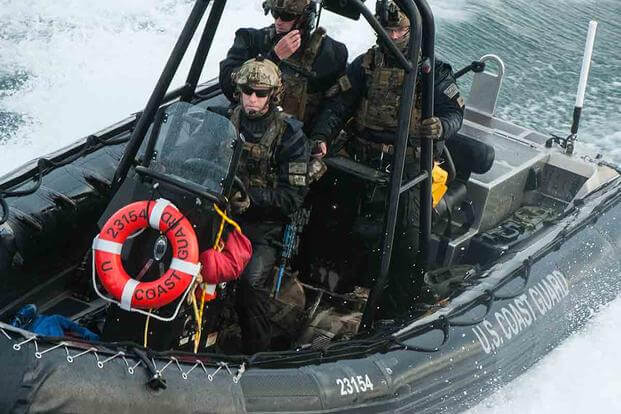
Coast Guard Officer Requirements
The Coast Guard offers a multitude of opportunities for professional specialization. Officers can be charged with law enforcement, humanitarian aid, defense, regulation, environmental protection, diplomacy and literally guarding the coast.
To join the Coast Guard as an officer, you must:
- Be at least 21 years old to enroll in Officer Candidate School, but age requirements for different officer programs vary
- Hold U.S. citizenship
- Meet commissioning physical standards, including normal color vision
- Earn a minimum score on the ASVAB, SAT or ACT
Although the Coast Guard does not offer an ROTC program, there are other paths to becoming an officer in the service:
- Direct commission: For leaders in professional fields such as law, medicine and religion. At completion of an officer training program, they are commissioned at a rank determined by their career branch.
- Officer Candidate School: Training for college graduates via classroom instruction and exercises. Applicants must have a GPA of at least 2.5.
- United States Coast Guard Academy (USCGA): The smallest military academy out of the five U.S. armed forces branches, it provides full scholarships and four-year bachelor of science degree programs. Roughly 200 students graduate each year and receive a commission as an ensign.
- College Student Pre-Commissioning Initiative (CSPI) Scholarship Program:
Read More: How to Become a Coast Guard Officer
How to Join the Coast Guard
Contact a Coast Guard Recruiter
The Coast Guard recruitment process begins with working with a Coast Guard recruiter. Recruiters know the ins and outs of the service and can help you navigate the process and make important decisions along the way.
There is no obligation when working with a recruiter. They will help you decide whether the Coast Guard is right for you, and they will help shed light on which job opportunities within the service might be of interest if you sign up.
Related: Contact a Recruiter
Take the ASVAB
The Armed Services Vocational Aptitude Battery (ASVAB) is an aptitude test that helps Guardsmen narrow down which field of work is best suited for them. It is designed to evaluate skills in several areas, including math, science, language and technical knowledge such as electronics, automotive and mechanical abilities.
The minimum ASVAB AFQT score for enlisting in the U.S. Coast Guard is 36. Officer programs have different standardized test requirements.
Pass Your Physical Exam
Once an applicant has taken the ASVAB and passed with a qualifying score, the recruiting process moves on to a medical exam at the Military Entrance Processing Station (MEPS).
The basic physical examination includes alcohol and drug testing; a urine check for indicators of glucose, protein, pregnancy and other health indicators; an HIV test; a vision test, including color perception; an ear exam and hearing test; blood pressure and pulse rate; an orthopedic and neurological demonstration and exam; plus an overall exam of the main body systems and organs.
Coast Guard weight requirements are based on body mass index (BMI), which is weight divided by height. Guardsmen must have a BMI between 19 and 27.5, regardless of age or gender.
Related: Your Questions About Joining the Coast Guard Answered
Coast Guard Basic Training
Coast Guard boot camp, aka basic training, lasts eight weeks and is held at the Coast Guard Training Center in Cape May, New Jersey.
"Boot camp" is mentally and physically tough. Much of your training will take place in a classroom learning first aid, firefighting, weapons handling, practical seamanship and general Coast Guard knowledge. You will have daily physical fitness and water survival classes. You also will learn military drill and the "ropes" of the U.S. Coast Guard.
Your Coast Guard pay begins during boot camp.
Read More: Coast Guard Boot Camp Timeline at a Glance
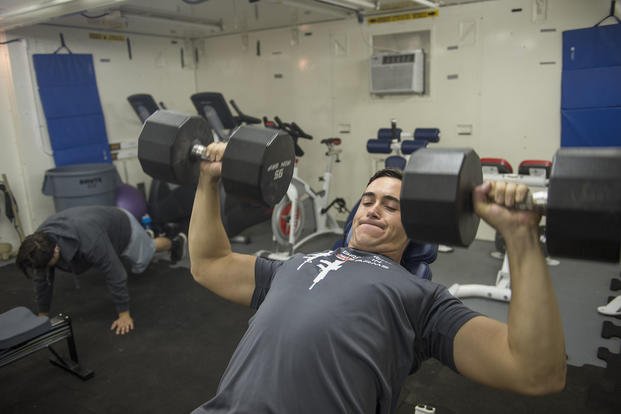
Taking the Physical Fitness Test (PFT)
Physical fitness requirements in the Coast Guard are directly linked to "on-the-job" requirements. The Coast Guard Physical Fitness Test (PFT), sometimes simply called the Coast Guard PT test, is designed to measure cardiovascular fitness and muscular endurance.
Read More: Coast Guard Basic PFT
Coast Guard Fitness Standards
Coast Guard men and women, who are rescue swimmers, small boat crew members, etc., must comply with the specific physical standards set forth by their position, but here are the general standards for the PFT and the 12-minute swim.
At boot camp, enlisted recruits are expected to perform:
- One minute of push-ups (men: 29, women: 15)
- One minute of sit-ups (men: 38, women 32)
- 1.5-mile timed run (men: 12:51, women: 15:26)
At Officer Candidate School (OCS), officer candidates are expected to perform:
- Cadence push-ups: one second down, one second up (men: 30, women: 20)
- Two minutes of sit-ups (men: 60, women: 60)
- 1.5-mile timed run (men: 10:59, women: 12:49)
Read More: Coast Guard Fitness Requirements
Choose Your Coast Guard Job
Coast Guard jobs are available in a variety of fields. About halfway through boot camp, recruits make note of their preferences from available assignments at different locations and unit types, and receive their first assignment orders about a week later.
Most recruits, at the beginning, are assigned as unspecialized seamen or firemen. Advanced specialty training follows this period of adjustment. Depending on your skill set and interests, you can get training in a variety of fields, including law enforcement, environmental science, engineering, health care and more.
Some recruits with high ASVAB scores are eligible to enroll in a specialized school immediately following boot camp, bypassing the unspecialized assignments and getting a head start on their careers.
Jobs are available in a variety of fields, including aviation, cybersecurity and information technology, navigation and seamanship, mechanical and electrical operations, diving, electronics, firearms maintenance, medical, machinery and more.
Read More: Coast Guard Job Opportunities

Take the Oath of Enlistment
To be sworn into the Coast Guard, you will take the Oath of Enlistment, which is a pledge to defend the Constitution throughout your military career. If you are entering as an officer, you'll instead take the officer's oath.
Related: Coast Guard: Officer Versus Enlisted Career Paths
Benefits of Joining the Coast Guard
Joining the Coast Guard comes with a variety of benefits.
Money and Pay
When you join the Coast Guard, your paycheck grows as you gain more experience and rise up the ranks. The service also offers a variety of allowances that increase your total compensation. These include free or reduced-cost health care, food, housing, education and more.
An advanced paygrade incentive may be offered to recruits with certain experience, like college credits, JROTC, police and sea explorer programs, or scouting achievements. This can result in an immediate promotion to E-3 paygrade after boot camp -- six months earlier than usual.
You also get 30 days of paid vacation annually.
Bonuses
The Coast Guard has several enlistment incentive programs to meet recruiting goals, such as signing bonuses. These could apply to all recruits, be tied to enlistments within certain time periods, or require qualifying skills, certifications or education.
In 2023, the service introduced a Scout Talent and Refer program, offering $1,000 to any member, retiree, reservist or civilian employee who steers a recruit to basic training.
The Coast Guard also added a bonus program for certain jobs -- signing bonuses of $15,000 to $50,000 for recruits interested in becoming a gunner's mate, culinary specialist or other understaffed rating.
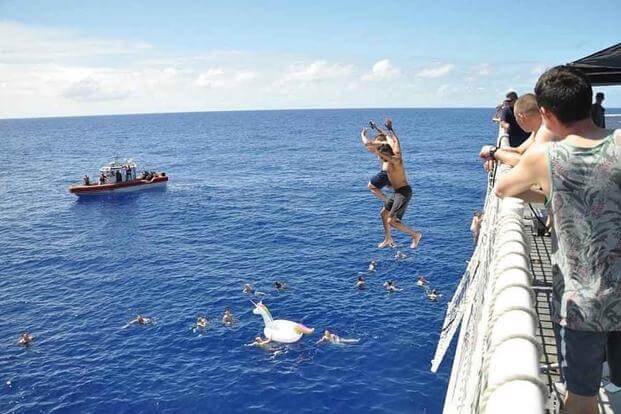
Education
While on active duty, you may continue your education and may be helped in defraying the cost of college-accredited courses.
On top of specialized job training in fields like law enforcement, environmental science, engineering, health care and more, the Coast Guard can fund your college education through the GI Bill and other programs, including Voluntary Education or VolEd.
You'll also have access to hands-on training and professional certifications that can open doors to post-Coast Guard career opportunities. The Credentialing Opportunities On-Line (COOL) program will reimburse the training necessary to obtain certain certifications. You may use the CG COOL program to enhance your skills, either in your current specialty or in an occupation you would like to pursue when you leave military service.
Additionally, the Coast Guard Institute offers the following programs:
- Up to 100% of your college tuition paid for active duty, selective reserve or Coast Guard federal employees.
- Coast Guard Foundation Grant open to active-duty enlisted personnel in paygrades E-3 to E-9 with at least two years of service.
- Coast Guard Mutual Assistance (CGMA) toward a family member's education expenses.
- The opportunity to take CLEP, DANTES and other tests at no cost for dependent spouses and Federal Coast Guard employees.
Learn more about the Coast Guard's educational programs here.
Skills and Training
The Coast Guard offers a variety of in-person and online courses and resources geared toward leadership and professional development.
For Guardsmen seeking specific credentials, the Credentialing Opportunities On-Line (COOL) program offers help with certifications and licenses related to their military occupation and civilian careers. These credentials can help in the job hunt after your Coast Guard career ends.
Health Care
Full-time, active-duty Guardsmen receive medical, dental and vision coverage for themselves and their dependents. Mental health support is also available.
Active-duty members typically receive medical care through Coast Guard clinics manned by the Public Health Service clinicians and Coast Guard health technicians. Guardsmen's family members usually receive care through the civilian Tricare network. Service members not located near a Coast Guard clinic and their beneficiaries also can get medical care at Defense Health Agency facilities.
Other Benefits
Guardsmen can receive discounted life insurance, retirement plan options, financial counseling and legal services.
You also may receive additional tax-free money for Basic Allowance for Housing (BAH) if government housing is not available; Basic Allowance for Subsistence (BAS), if government food facilities are not available in the area you are stationed; and a uniform allowance (for enlisted personnel only) to help maintain your uniform.
Additionally, Guardsmen receive exchange and commissary privileges, moving allowances, temporary lodging expenses, travel, survivor benefits, Veterans Affairs home loans and more.
Content previously published on Military.com and content from gocoastguard.com were used in compiling this report.
Interested in Joining the Military?
We can put you in touch with recruiters from the different military branches. Learn about the benefits of serving your country, paying for school, military career paths, and more: sign up now and hear from a recruiter near you.
